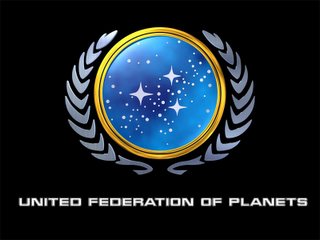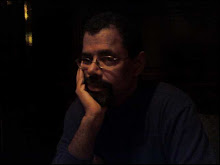 It was a minor scene in Star Trek: Enterprise, the speaker noted, but it said everything about where the show believed that we can and will go in the future.The famous starship captain had just finished a call-in interview from space with a grade school class back on Earth. “Now class, let’s say the pledge”, the teacher said. The class replied, “We pledge allegiance, to the flag, of the Federal Republic of Earth …”.
It was a minor scene in Star Trek: Enterprise, the speaker noted, but it said everything about where the show believed that we can and will go in the future.The famous starship captain had just finished a call-in interview from space with a grade school class back on Earth. “Now class, let’s say the pledge”, the teacher said. The class replied, “We pledge allegiance, to the flag, of the Federal Republic of Earth …”.The speaker, Tad Daley, visionary, professor, advisor and congressional candidate, (go here for the full bio) came to Sacramento to speak a presumably supportive collection of Unitarians and fellow travelers on a warm October 2005 Sunday afternoon. Having always been a fan of Star Trek in part due to the vision of planetary unity (a popular theme in science fiction) and the speaker’s views on the United Nations, I just couldn’t resist.
Daley challenged the idea of reforming the UN under current proposals. The fundamental problem, he said, it’s that it’s still a collection of states and can therefore only serve particularly state interests. We need to “reinvent” it, he said. This requires connecting the body with people, not national governments. Reinvention requires: 1. Direct election of representatives to a new arm of the body
2. Expanding membership of the Security Council and ending of the single veto in favor of majority or supermajority decision making.
3. A separate funding system for reliable and independent revenues
4. A volunteer peacekeeping force not provided by nation states but by individuals
Direct election of representatives to a new “Assembly” body would put UN and international issues on the political burner for the average person. Citing the European Parliament as an example, he said such a move would likely encourage development of international political party alliances, as groups with common international interests would find cause and reason to find common ground, as we see in national campaigns and elections today. It’s a matter of fundamental right, Daley said. We all live on the same planet. Why should our political representation stop at the water’s edge?
My own view is that this body should replace the current General Assembly, which has fallen into obscurity after initially being established to provide a similar “legislative” function as Daley prescribes for his Assembly. It was the General Assembly, in fact, which approved the partition of Palestine which led to the successful birth of Israel. It’s never held that kind of political power or responsibility since.
Daley holds that the Security Council is an anachronistic relic of the post-WW2 arrangements and subsequent Cold War. It needs to be expanded and the power of a single nation to block action removed. The current veto arrangement, he says, is the UN’s most undemocratic process and frustrates the will of the majority to deal with real issues.
Now, personally, I’m not too sure about this part. Passing resolutions which would simply be unenforceable against larger powers would lead to frustration and the appearance of impotence at a time it needs to appear stronger. It seems to envisage the Council as morphing into an international Senate to complement the two current and proposed Assembly bodies. The practical point of the Security Council was to have the countries with the most firepower accountable and responsible for keeping the peace, since they had the guns to do it. Unless the UN is willing and able to develop a consequent military force able to take on, say, Iran, then the current arrangement, as frustrating as it can be and as undemocratic as it may be, should stay put for now. As a compromise, certain acts, such as economic sanctions or non-binding censure motions could be taken out from under the veto. This would empower nations who at least want to get a loud opinion on a matter spoken and heard.
One of the problems our constitutional founders had to deal with was Congress’s initial inability to raise direct revenue. The UN faces the same problem, always subject to blackmail by nations looking to use national contributions for political purposes. The solution is simple. Give the UN an independent revenue source. Daley proposes a modest tax on international currency exchanges. Average people won’t have to pay it, the system for collecting it already exists and given the size of the exchanges made on an annual basis would bring in enough revenue to fund the body.
What would the revenue pay for? Among other things, an international peacekeeping force made up not of national forces, but by volunteers who signed on to the UN directly. The forces would require transport and support, and would be authorized to shoot and defend themselves if necessary. The Secretary-General could order them in during a clear humanitarian crisis, or the Council could authorize an extended deployment, Daley proposed. These arrangements could be worked out. But imagine, one in the audience said, if such a force existed today then Rwanda and Sudan, where those massacred don’t have the benefit of oil to interest outside powers, could have been prevented.
Visionary? Yep. But likely too, and Americans of all people should see this. The Civil War was fought over whether the land was one nation or a collection of sovereign states. With the Commies’ fall ending the Cold War, our own global “Civil War” has ended. We just haven’t worked out how to unite, or reunite, if we go back to before the rise of the nation-state, the world. But it’ll happen. The great story of the 19th century was the struggle to develop stable nation-states (US, Germany, Italy as example, Austria-Hungary as an example of how not to do it). The 20th century was marked by the assault on liberal democratic national ideals by nightmarish nationalist (including Communism as it developed) ideologies. It seems logical then that the 21st century be the time we all learn the pledge to the Federal Republic of Earth.
Besides, after that happens, can faster-than-light space travel be far behind?
Go here for more information on what we can do to reinvent the United Nations.

No comments:
Post a Comment